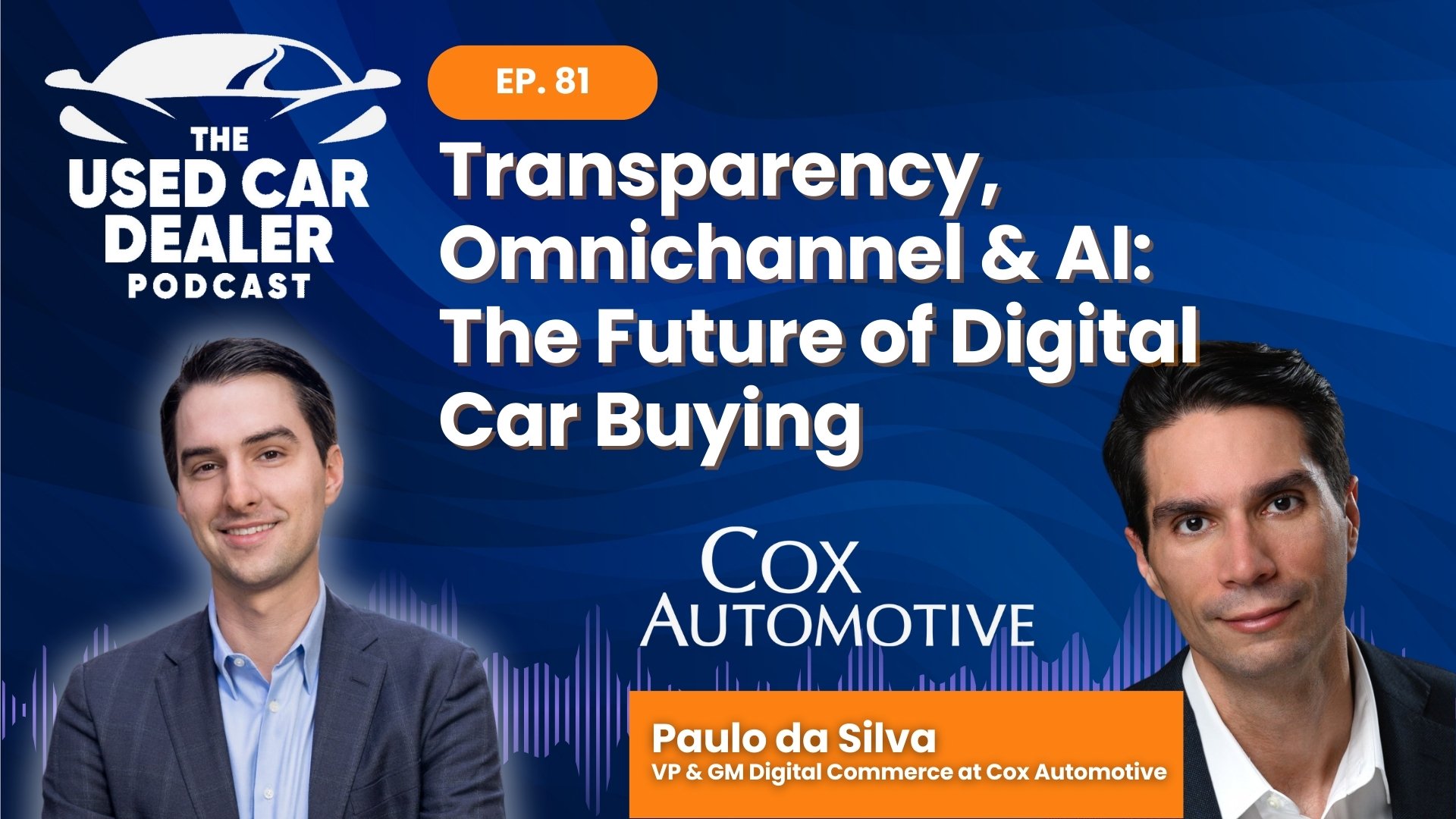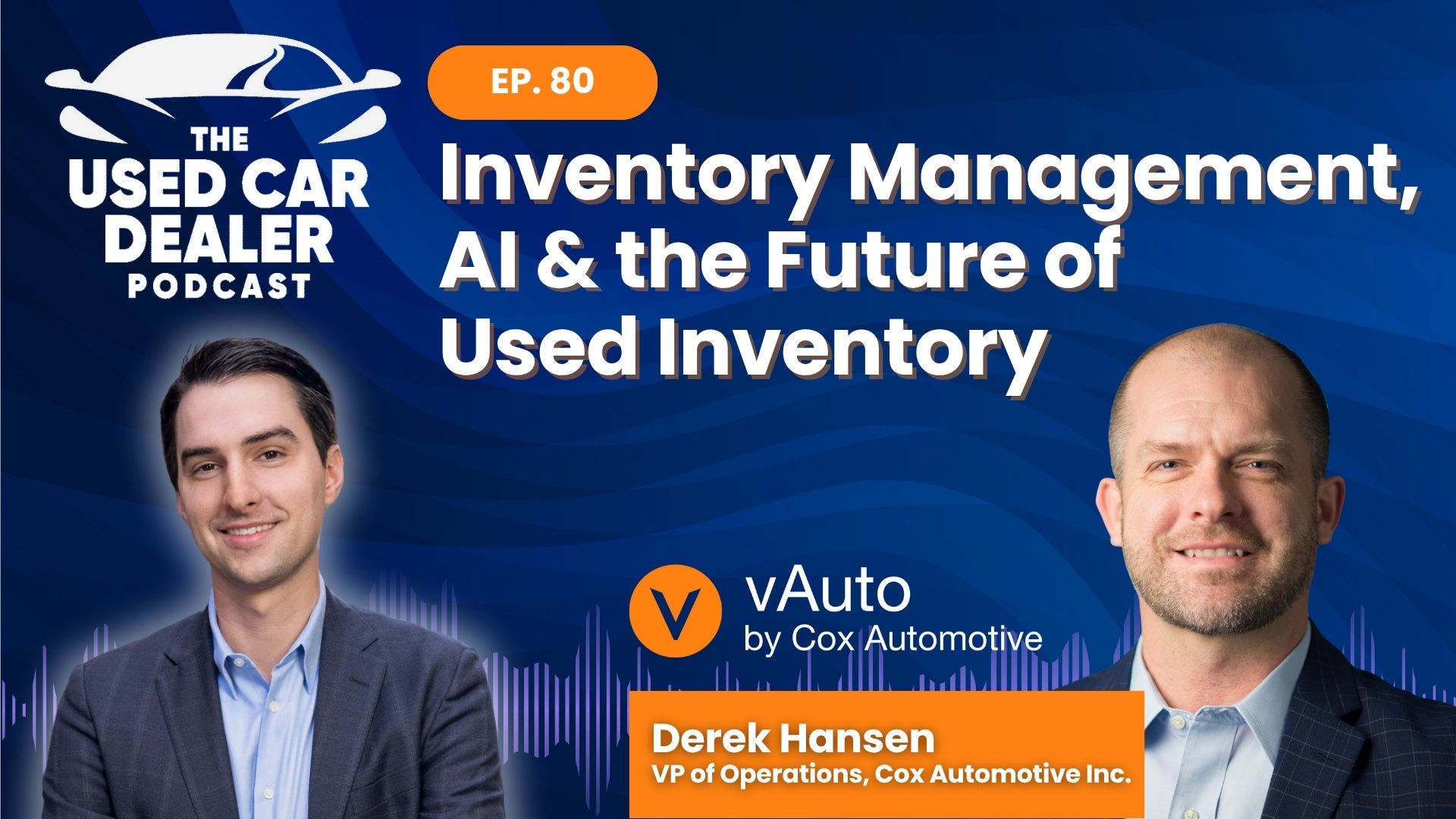Hello, Zach here. I'm back again. And we have a fantastic guest on the podcast today, Randy Kobat the Vice President of Inventory Management Solutions at Cox Automotive. Thank you so much for joining the podcast today.
Randy Kobat: Thanks for having me, Zach, I appreciate it.
Zach Klempf: So let's get started. And for those of us listening, talk about how you got into the auto industry.
Randy Kobat: Well, I mean, early in my career, I was in the chemical industry. So from a supplier perspective, we did a lot of work with car manufacturers. Early in my career, we were instrumental in helping the car manufacturers create an airbag cover that didn't smash into a million pieces at 10 degrees below zero. So I've always kind of worked very closely with car manufacturers. But I guess from really in being in the industry, from a software perspective, it wasn't until after I finished grad school and spent some time in consulting, that I was able to join what was at the time, ADP dealer services now CDK, where I spent about 10 years of my career in a variety of roles, starting as Head of Strategy for that division, as well as general manager of a couple of different businesses and registration and titling and fixed op software.
Zach Klempf: So you in the Cox team recently got back from NADA and yes, in person again, what were some of the new exciting announcements from that event?
Randy Kobat: One of the things that we were extremely excited about is the opportunity to continue to tell our story around inventory management software. And as the leader in inventory management software in the industry, from a used car perspective, we have been really excited about how we've been able to evolve and continue to innovate in that space and bring profit time GPS to market. Profit time GPS is a way to improve used car profitability, even beyond the tremendous numbers that car dealers are experiencing today from a used car profit perspective, as well as an opportunity to improve the way that you acquire cars, which for many of the people listening to this podcast is top of mind every day as they go to work. A couple of other things that we brought to market was Upside, our new solution that we brought to market for wholesale acquisition and disposition, as well as improvements and updates to Kelley Blue Book instant cash offer where we continue to create better connections for direct from consumer inventory acquisition opportunities.
Zach Klempf: And how does that help used car dealers?
Randy Kobat: Which one Kelley Blue Book instant cash offer?
Zach Klempf: The upside from Cox?
Randy Kobat: It's an opportunity to, you know, really be more competitive in the marketplace today. There are a lot more competitors today in wholesale than there ever have. And they're mostly very digital-focused, and they're faster, there's a lot more certainty around the transaction rates. And they're at lower costs than the traditional wholesale marketplaces that many people are aware of today. So we've entered into the digital game more aggressively by bringing together two of the strongest brands in used cars, wholesale acquisition, and inventory management between Vauto and Mannheim, to bring a Cox automotive solution that works across the enterprise to bring the best solution we believe from a wholesale acquisition perspective.
Zach Klempf: So, Randy, talk to me about the wholesale market dynamics, and specifically how new sourcing and acquisition channels are opening up to help us car dealers find and stock vehicles more profitably.
Randy Kobat: Sure. You know, I think most dealers used to rely on traditional auctions and trade-ins that would happen in the market based on new car inventory primarily. And when the auction lanes closed, and new car inventory dried up so that those trade-ins weren't happening as naturally as they were before. The dealers really needed to pivot and find new ways to acquire good quality used cars. And so one of the ways that dealers have really evolved over the last two years, is trying to acquire cars directly from consumers more aggressively than they ever had. We'd like to say that we are going where the snow melts, were those consumers on those cars and they're interested in finding another good quality car, or they have an extra car in their garage that they just don't need given the virtual work environment that they're now participating in here in the United States. And we've given them additional opportunities for dealers to acquire those cars directly from consumers.
Zach Klempf: So if you were running a used car dealership and put that hat on for a second, what would be this central software solution, you would have to manage everything from inventory acquisition to inventory pricing?
Randy Kobat: Sure, you know, I think the lifeblood of any dealership is inventory. So the ability to manage and price it and promote it and get it ready to be sold is more important now than ever. So I would definitely invest on the variable side of the operation, to be able to acquire good quality used cars, good quality promotions to get that car recognized online so that you can get that consumer engaged in the quality inventory that you have available to sell. And then one of the interesting things that we've been focused on over the last couple of years, is there still about half the market today that are using spreadsheets and whiteboard when it comes to reconditioning cars to get them ready for line ready to be sold. So reconditioning is really a hot topic these days to get cars ready faster, to be sold faster.
Zach Klempf: So Randy, what do you think has been the most surprising in terms of the auto industry in 2022? Thus far?
Randy Kobat: It's interesting if you looked at some of the predictions that Jonathan Smoke or Chief Economist has had in the first quarter is one of the things where, you know, he's been honest, right? He kind of missed from a report card perspective that the tight supply of new car inventory would improve. And we just haven't seen it like we thought it would bounce back. And then I think the other thing is, you know that there with that additional new car inventory coming back online, there would be a need for more incentives. And that hasn't happened either. So things like attractive lease rates just haven't materialized like we thought that they would.
Zach Klempf: So if you had a crystal ball, what would be your predictions for the US car marketplace in 2022.
Randy Kobat: So we still think that the market is probably going to sell about 39 million used cars this year. And a little bit more than half of those are going to go through retailers. And from a wholesale perspective, you know, we think that throughout the year, wholesale prices will gradually decline, not dramatically, but they will continue to come down to more normal rates from an MMR perspective.
Zach Klempf: And lastly, what's coming down the pipeline in the divisions you manage that you're most excited about? It's relevant to us car dealers.
Randy Kobat: I think in all that we do we continue to focus on improving the profitability of used cars for our dealers. So whether that's the way that they manage their inventory and the way that they appraise inventory, the way that they dispose of inventory through new solutions like upside, as well as new opportunities to acquire inventory from different channels, like the service drive, off-street purchases, and connecting consumers interested in selling their car to a dealer is still very much our focus this year. And we continue to evolve and innovate in those specific areas across all of our products, whether that be the auto offerings, or new things like upside, or Kelley Blue Book, instant cash offer.
Zach Klempf: And another question. Kelley Blue Book, their instant cash offer, we see a lot of used car dealers leverage that product. Why is that becoming a very popular tool for used car dealers in this inventory shortage challenge?
Randy Kobat: Sure. One of the things that we've really been focused on is a term that's used by behavioral economists called the endowment effect. And the endowment effect is basically that if you own something, you believe that it's worth a lot more than it really is. And so when you bring the most trusted brand and automotive Kelley Blue Book to the game, it helps consumers understand what their car is worth, and bring a lot more credibility to that number than if a dealer just pulled it off of their hat or came out of a back room. So there's a lot more believability and trust created immediately between the consumer and the dealer because the dealer is using the Kelley Blue Book number.
Zach Klempf: And is there anything that I haven't touched on that you wanted to bring up?
Randy Kobat: I don't think so. It's been a really good opportunity for us to reconnect with our dealer partners at nada. It was wonderful to be in person and get a chance to shake hands again. And I think our industry is the biggest small industry I've ever worked in. Everybody knows everybody, and it was wonderful to have a chance to spend time together.
Zach Klempf: Definitely agree, Randy. And thank you so much for joining me on the podcast today.
Randy Kobat: Thanks, Zach. I appreciate it.

.png)




.jpg)
.jpg)
.jpg)
.jpg)

.png)
.png)
